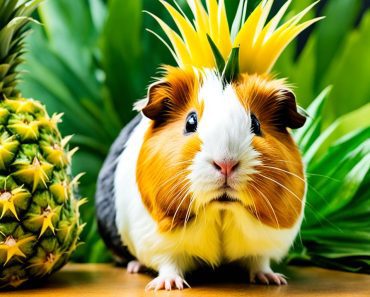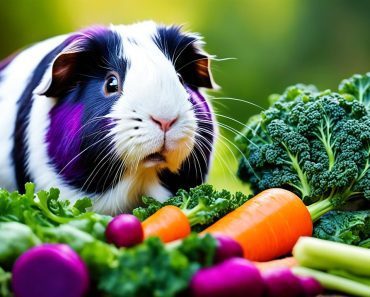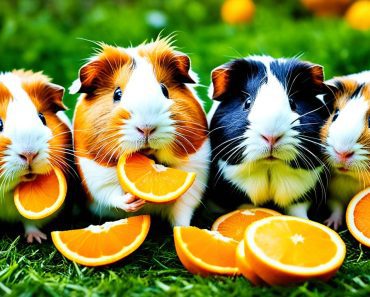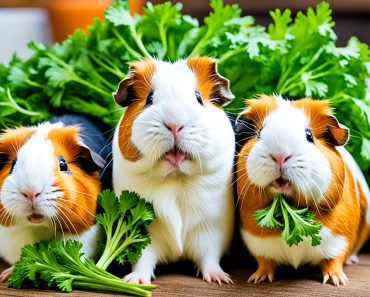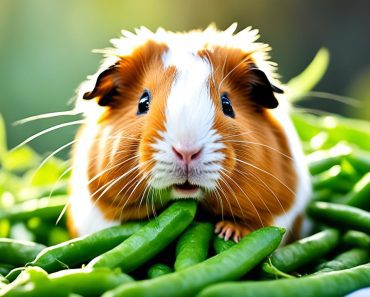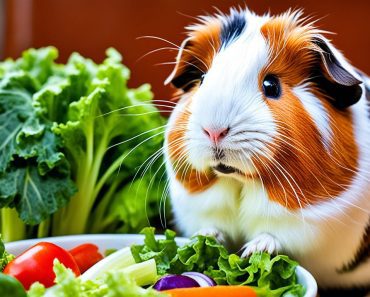As a proud guinea pig owner, I constantly strive to provide my furry friend with a healthy and balanced diet. One question that often comes to mind is whether guinea pigs can eat carrots. After consulting with my trusted veterinarian, I have gathered some vet-approved tips to share with you.
Guinea pigs require a well-rounded diet consisting of pellets, hay, and fresh vegetables. Since they cannot produce their own vitamin C, it’s crucial to include foods rich in this essential nutrient to prevent health issues like scurvy. Fortunately, carrots are safe for guinea pigs to eat and offer numerous health benefits.
Can Guinea Pigs Eat Carrots? Yes, they can, in moderation.
- Guinea pigs need a balanced diet of pellets, hay, and fresh vegetables.
- Carrots are safe for guinea pigs and provide essential nutrients like vitamin C.
- Include a variety of fresh vegetables, hay, and pellets in your guinea pig’s diet.
- Consult with a veterinarian for specific dietary recommendations for your guinea pig.
- Ensure uneaten food is removed daily to prevent spoilage.
The Importance of Hay in a Guinea Pig’s Diet
Hay plays a crucial role in the overall health and well-being of guinea pigs. Not only does it aid in digestion, but it also helps control the growth of their teeth, which continuously grow throughout their lives. Additionally, hay provides essential nutrients that are necessary for a balanced guinea pig diet.
When it comes to hay, there are different types to consider. Grass hay, such as timothy hay, orchard hay, and alfalfa hay, should make up the majority of a guinea pig’s diet. These types of hay provide the necessary fiber to maintain healthy digestion and prevent gastrointestinal issues.
Timothy hay is the most commonly recommended type of grass hay for guinea pigs. It has a balanced nutritional profile and is low in calcium, making it suitable for guinea pigs of all ages. Orchard hay is another great option, as it offers a similar nutritional profile to timothy hay.
Alfalfa hay, on the other hand, is higher in calcium and protein, making it an ideal choice for younger guinea pigs. It provides the necessary nutrients for their growing bones and overall development. However, it should be fed in moderation to adult guinea pigs, as the high calcium content can lead to urinary issues.
It’s important to offer fresh, high-quality hay to guinea pigs daily. Place the hay in a hay rack or hay ball to keep it clean and prevent it from becoming soiled. Make sure to remove any uneaten or wilted hay to maintain freshness.
Overall, hay is an essential component of a guinea pig’s diet. By providing the appropriate type of hay and ensuring a consistent supply, you can support their digestive health, dental care, and overall nutritional needs.
Here is a comparison of the different types of hay for guinea pigs:
| Type of Hay | Main Benefits | Suitable for |
|---|---|---|
| Timothy Hay |
| Guinea pigs of all ages |
| Orchard Hay |
| Guinea pigs of all ages |
| Alfalfa Hay |
| Young guinea pigs |
By incorporating the right type of hay into your guinea pig’s diet, you are providing them with essential nutrients and promoting their overall health. Remember to always consult with a veterinarian for specific dietary recommendations based on your guinea pig’s age, weight, and overall health.
Selecting the Right Commercial Food for Guinea Pigs
When it comes to providing proper nutrition for your guinea pig, selecting the right commercial food is essential. Guinea pigs should be fed timothy-based pellets that are fortified with vitamin C. These pellets serve as the foundation of their diet and provide the necessary nutrients for their overall health.
| Key Considerations for Commercial Food: |
|---|
| Timothy-Based Pellets: Choose pellets made primarily from timothy hay, as it is a nutritious and essential component of a guinea pig’s diet. |
| Vitamin C-Fortified: Ensure that the pellets are fortified with vitamin C since guinea pigs cannot produce this vital nutrient on their own. |
| Avoid Seeds and Dried Fruit: Check the ingredient list to ensure the pellets do not contain any seeds or dried fruit, as these can be harmful to your guinea pig’s health. |
It’s important to offer your guinea pig approximately 1/8 cup of pellets per day, in addition to a variety of fresh vegetables and a constant supply of hay. Hay should make up around 80% of your guinea pig’s diet, with the pellets providing additional nutrition.
Remember, vitamin C in pellets can degrade over time, so it’s crucial to supplement your guinea pig’s diet with vitamin C-rich vegetables and fruits. This ensures that your furry friend receives an adequate amount of this essential nutrient.
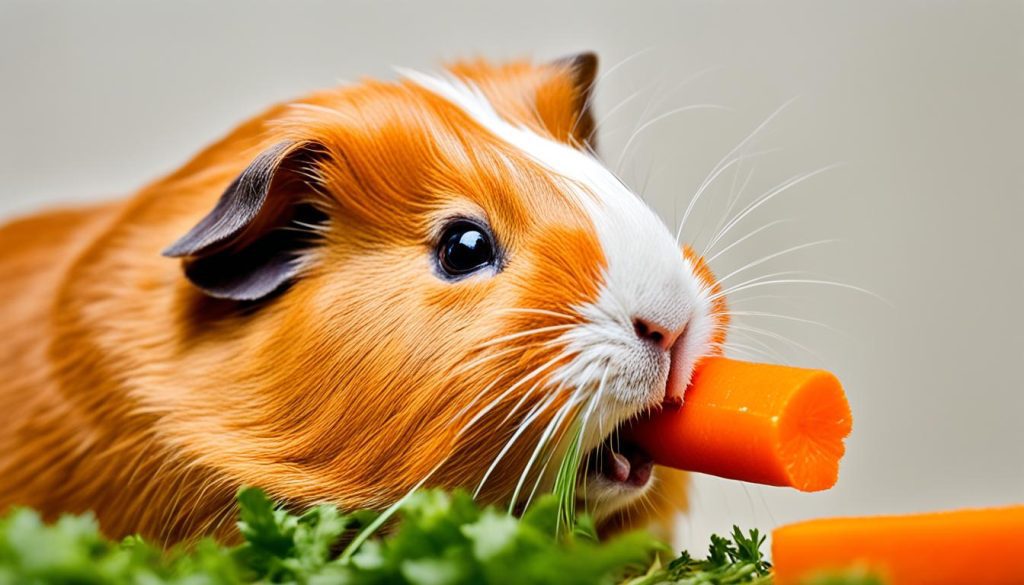
Incorporating Fresh Vegetables into a Guinea Pig’s Diet
Fresh vegetables are an important part of a guinea pig’s diet, providing essential nutrients and variety. Including a variety of leafy greens and vitamin C-rich vegetables can help keep your guinea pig healthy and happy. Here are some key tips for incorporating fresh vegetables into your guinea pig’s daily diet:
- Offer vegetables once a day: Aim to give your guinea pig fresh vegetables once a day, alongside their hay and pellets. This helps provide them with a diverse range of nutrients.
- Leafy greens as the main components: Make leafy greens such as romaine lettuce, mustard greens, kale, and parsley the main components of your guinea pig’s vegetable intake. These greens are packed with essential vitamins, minerals, and fiber.
- Include vitamin C-rich vegetables daily: Guina pig require a steady supply of vitamin C to stay healthy. Include vitamin C-rich vegetables, such as red and green peppers and broccoli, in their daily vegetable portion to ensure they get an adequate amount of this essential nutrient.
- Offer other vegetables weekly: While leafy greens and vitamin C-rich vegetables should be included daily, other vegetables like carrots, zucchini, tomatoes, and sweet potatoes can be given once or twice a week as a treat. These treats will provide additional variety and flavors to your guinea pig’s diet.
Remember to introduce new vegetables gradually and monitor your guinea pig’s response. Some guinea pigs may have preferences or sensitivities to certain vegetables. Always ensure that the vegetables you offer are fresh, washed, and free of pesticides.
Guide to Fresh Vegetables for Guinea Pigs
| Vegetable | Serving Frequency | Notes |
|---|---|---|
| Romaine Lettuce | Daily | Rich in vitamins A and K |
| Mustard Greens | Daily | Good source of vitamin C and fiber |
| Kale | Daily | High in vitamin C and calcium |
| Parsley | Daily | Rich in vitamin C and calcium |
| Red and Green Peppers | Daily | Excellent source of vitamin C |
| Broccoli | Daily | High in fiber and vitamin C |
| Carrots | Once or twice a week | Good source of vitamin A |
| Zucchini | Once or twice a week | Low in calories and high in water content |
| Tomatoes | Once or twice a week | Contain lycopene and vitamin C |
| Sweet Potatoes | Once or twice a week | Rich in vitamins A and C |
By incorporating fresh vegetables into your guinea pig’s diet, you can ensure they receive a range of essential nutrients for optimal health and well-being. Remember to offer a variety of vegetables and consult with a veterinarian if you have any concerns or questions about your guinea pig’s diet.
Adding Fruit as an Occasional Treat for Guinea Pigs
Fruit can be a delightful and nutritious addition to a guinea pig’s diet. While it provides essential vitamins and minerals, it should be offered as an occasional treat due to its high sugar content. Including a variety of vitamin C-rich fruits can enhance your guinea pig’s overall nutrition.
Fruits such as kiwis, strawberries, and citrus fruits are excellent choices for guinea pigs as they are packed with vitamin C. Vitamin C is vital for these adorable pets as they cannot produce it naturally, just like humans.
When offering fruits, it’s crucial to control the portion size to prevent excessive sugar intake. A small wedge of orange or apple, a few blueberries, or a thin slice of banana are sufficient to satisfy their taste buds without compromising their health.
Remember, fruits should never replace the main components of a guinea pig’s diet, such as hay and fresh vegetables. Instead, consider them as special treats to provide variety and enjoyment for your furry friend.
For a comprehensive understanding of safe fruits and their benefits, refer to the list below:
Safe Fruits for Guinea Pigs
- Kiwis
- Strawberries
- Citrus fruits (oranges, lemons, etc.)
- Blueberries
- Apples (in moderation)
- Bananas (in moderation)
Introduce fruits gradually into your guinea pig’s diet to observe their reaction and prevent any digestive upset. Monitoring their overall health and well-being is essential when making dietary changes.
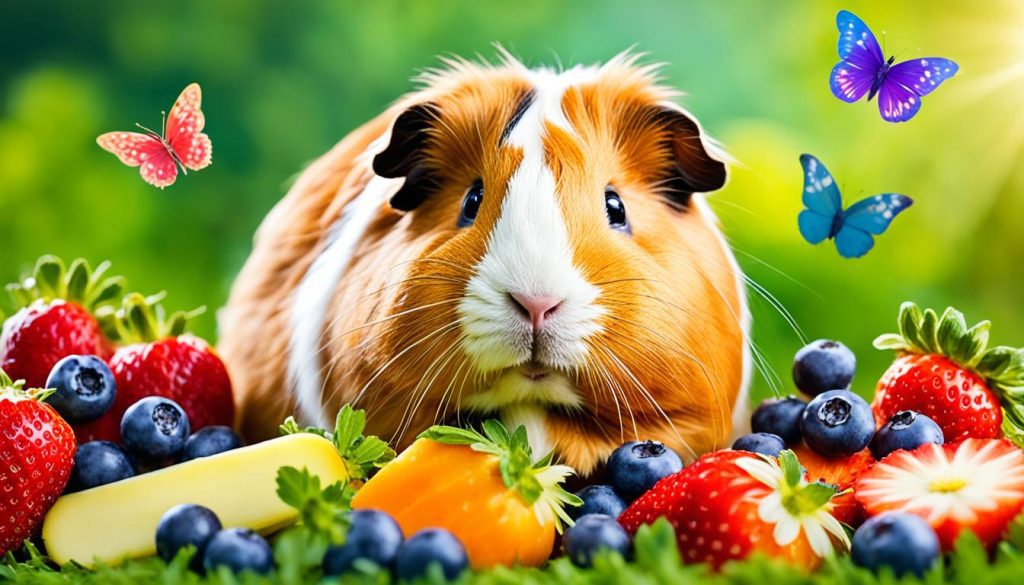
Providing a balanced diet that includes hay, fresh vegetables, pellets, and occasional fruit treats is key to maintaining your guinea pig’s optimal health. Remember, always consult with a veterinarian to ensure you are meeting your guinea pig’s specific dietary needs.
Feeding Tips for Guinea Pig Owners
As a responsible guinea pig owner, it’s crucial to ensure that your furry friend receives a healthy and balanced diet. Here are some essential feeding tips to keep in mind:
Maintain a Clean Habitat
It’s important to remove any uneaten fruits, vegetables, and other perishable foods from your guinea pig’s habitat to prevent spoilage. This helps to maintain a clean and hygienic environment for your pet.
Check for Spoiled Treats
Regularly check for untouched or unfinished treats to ensure that they are not spoiled. Spoiled food can be harmful to your guinea pig’s health, so it’s important to remove any spoiled items promptly.
Replace Pellets Daily
Guinea pig pellets should be replaced daily to ensure they remain fresh and retain their vitamin C content. Vitamin C is essential for your guinea pig’s overall health, so it’s crucial to provide them with fresh pellets regularly.
Monitor Food Consumption
Be mindful of the amount of food you give to your guinea pig. If you consistently find many pellets left uneaten, consider reducing the portion size to prevent overfeeding. It’s important to provide your guinea pig with appropriate portion sizes to maintain a healthy weight.
Understanding Coprophagy
It may surprise you to learn that guinea pigs engage in a behavior called coprophagy, which involves eating their own stool. While it may seem odd, this behavior is perfectly normal and serves as a way for guinea pigs to obtain essential nutrients that may have been missed during the initial digestion process.
By following these feeding tips, you can ensure that your guinea pig receives a nutritious and well-balanced diet for optimal health and well-being.
| Safe Vegetables for Guinea Pigs |
|---|
| 1. Romaine Lettuce |
| 2. Mustard Greens |
| 3. Kale |
| 4. Parsley |
| 5. Red and Green Peppers |
| 6. Broccoli |
| 7. Carrots (in moderation) |
| 8. Zucchini |
| 9. Tomatoes |
| 10. Sweet Potatoes |
Conclusion
After considering the nutritional needs of guinea pigs, it is clear that carrots can be included in their diet in moderation. Carrots provide important nutrients such as vitamin C, fiber, and other essential vitamins and minerals. However, it’s crucial to remember that guinea pigs require a balanced diet that includes a variety of fresh vegetables, hay, and pellets to ensure they receive all the necessary nutrients for their overall well-being.
To provide the best nutrition for your guinea pig, it’s important to avoid feeding them processed or cooked foods. Additionally, certain foods can be toxic to guinea pigs, so it’s essential to be cautious and knowledgeable about the foods you offer them. If you have any doubts or concerns about your guinea pig’s diet, it’s always recommended to consult with a veterinarian who can provide specific dietary recommendations tailored to your pet’s needs.
Remember, variety is key when it comes to a guinea pig’s diet. While carrots can be a beneficial addition, it’s also important to incorporate a range of other fresh vegetables to provide different nutrients and flavors. Leafy greens like romaine lettuce, mustard greens, and kale can be the main components of their vegetable intake. You can also include vitamin C-rich vegetables such as red and green peppers or broccoli.
By offering a well-balanced and varied diet, you can ensure that your guinea pig stays healthy and receives all the necessary nutrients for a happy life. So go ahead and include carrots as part of their daily meals, along with other veggies, hay, and pellets, to provide them with a nutritionally balanced and enjoyable diet.

